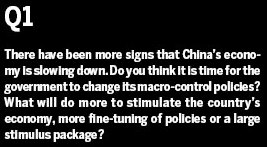How can China prevent a hard landing?
Updated: 2012-05-25 11:32
(China Daily)
|
||||||||
|
|
Wang Jun
Deputy Director-General of the Consulting Research Department of the China Center for International Economic Exchanges
 |
The government is stepping up easing efforts at a modest pace as the pressure of the country's cooling economic growth is increasing.
Premier Wen Jiabao urged the country to pay more attention to "stabilizing economic growth" at a meeting of the State Council on Wednesday, which was expected to accelerate the policy fine-tuning more forcefully.
The Chinese growth outlook remains difficult, while the economic situation is becoming more complicated than expected.
The GDP growth rate for the second quarter may slow to less than 8 percent and industrial output may show single-digit growth. That may push the central bank to cut the benchmark interest rate in the third quarter.
However, there is no need to suddenly, completely loosen policy, because a moderate slowdown is necessary for economic restructuring.
 |
Along with price declines for food and international commodities, inflationary pressure is likely to continue reducing during the third quarter, leaving more space for the authorities to loosen monetary policy.
Because of cooling economic growth, manufacturers' input and output prices are also on track to decline.
Inflation may slightly rebound in the fourth quarter because of seasonal factors, but it is possible that the full-year CPI can be held below 4 percent.
 |
Tight housing policies have effectively curbed both the transaction volume and prices in recent months, which has limited investment and associated consumption, such as interior decoration and furniture.
The weak real estate market is also the main force behind the current sluggish economic situation, which may need a slight fine-tuning in the coming months
The policy easing may include loosing credit controls and reducing the down payment for first-home purchases. Local governments may have policy flexibility depending on changing conditions.
 |
A better choice to boost domestic consumption is to ease fiscal policy. The expansion of fiscal expenditure on improving living standards, developing the energy-conservation and emission-reduction industries and supporting small businesses can be seen as the most effective methods.
Existing policies for encouraging consumption are not strong enough, amid the fast decrease of exports. Household incomes should be raised soon, on a larger scale.
At the same time, tax cuts are necessary to boost employees' incomes and increase demand, especially for export-oriented manufacturing companies, which are having a difficult time with the eurozone contraction set to deepen and the US economy likely to decelerate in the second quarter.

 Relief reaches isolated village
Relief reaches isolated village
 Rainfall poses new threats to quake-hit region
Rainfall poses new threats to quake-hit region
 Funerals begin for Boston bombing victims
Funerals begin for Boston bombing victims
 Quake takeaway from China's Air Force
Quake takeaway from China's Air Force
 Obama celebrates young inventors at science fair
Obama celebrates young inventors at science fair
 Earth Day marked around the world
Earth Day marked around the world
 Volunteer team helping students find sense of normalcy
Volunteer team helping students find sense of normalcy
 Ethnic groups quick to join rescue efforts
Ethnic groups quick to join rescue efforts
Most Viewed
Editor's Picks

|

|

|

|

|

|
Today's Top News
Health new priority for quake zone
Xi meets US top military officer
Japan's boats driven out of Diaoyu
China mulls online shopping legislation
Bird flu death toll rises to 22
Putin appoints new ambassador to China
Japanese ships blocked from Diaoyu Islands
Inspired by Guan, more Chinese pick up golf
US Weekly

|

|








